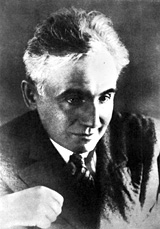Les Kurbas
| Les Kurbas Лесь Курбас |
|
|---|---|
 |
|
| Born | Oleksandr-Zenon Kurbas February 25, 1887 Sambir, Galicia, Austria-Hungary |
| Died | November 3, 1937 (aged 50) Sandarmokh, Medvezhyegorsk, Soviet Union |
| Occupation | theater director |
| Nationality | Ukrainian |
| Alma mater |
University of Vienna Lviv University |
| Period | 1915-1933 |
| Notable awards | People's Artist of Ukraine (1925) |
Oleksandr-Zenon Stepanovych Kurbas (Ukrainian: Олександр-Зенон Степанович Курбас, 1887–1937), a Ukrainian movie and theater director, is considered by many to be the most important Ukrainian theater director of the 20th century. He formed together with Vsevolod Meyerhold, Yevgeny Vakhtangov and several other directors the Soviet theater avantgarde in the 1920s and 1930s. He is considered to be one of the lead figures of Executed Renaissance.
Kurbas was born in Sambir (then part of Austria-Hungary) on February 25, 1887 and was given a double name Oleksandr-Zenon, for short Les or Oles. His father, Stepan Pylypovych Kurbas (Yanovych) (1862–1908), was a Ruthenian actor who descended from Lithuanian lineage. His mother, Vanda Adolfivna, was also an actress, the daughter of an Austrian, Adolf Teichman. His parents' last name Yanovych was their pseudonym, for which they were better known, particularly in theater of "Ruska besida". Beside Les who was the first child there were three other children Kornylo, Nestor, and Nadia, however none of them survived past their teenage years.
At fist Kurbas studied at Ternopil gymnasium. In 1907 he enrolled into the Philosophy Department of University of Vienna from where he transferred out in 1908, due to his father death enrolling later in Lviv University (1908–1910). This was determined by the need to lead Ukrainian culture out of the provincialism it had fallen into as a result of the century-long occupation by Poland and Russia.
In the midst of the first world war Kurbas formed the "Ternopil theatrical evenings" (1915–1916) and the Molody Teatr (Young Theater) in Kiev in 1916, which was the first ensemble to experiment with both new and ancient acting techniques. Kurbas directed and acted in plays such as Gogol's Revizor and, most importantly and to much acclaim, Sophocles' Oedipus the King. Due to the shortage in resources and the general political chaos towards the end of the First World War the ensemble was disbanded. Along with it he was a professor at the Kiev Music-Drama Institute in 1916-1919 and later Kharkiv Music-Drama Institute in 1926-1933. In 1920-21 Les Kurbas has found a Kiev Drama Theater "Kiydramte".
...
Wikipedia
